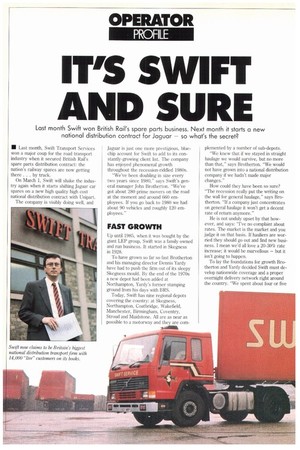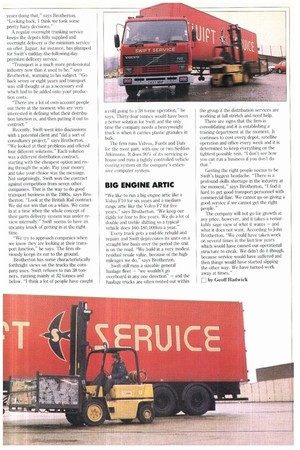IT'S SWIFT AND SUR
Page 34

Page 35

If you've noticed an error in this article please click here to report it so we can fix it.
Last month Swift won British Rail's spare parts business. Next month it starts a new national distribution contract for Jaguar — so what's the secret?
• Last month, Swift Transport Services won a major coup for the road transport industry when it secured British Rail's spare parts distribution contract: the nation's railway spares are now getting there . . . by truck.
On March 1, Swift will shake the industry again when it starts shifting Jaguar car spares on a new high quality high cost national distribution contract with Unipart.
The company is visibly doing well. and Jaguar is just one more prestigious, bluechip account for Swift to add to its constantly-growing client list. The company has enjoyed phenomenal growth throughout the recession-riddled 1980s.
"We've been doubling in size every two years since 1980," says Swift's general manager John Brotherton. "We've got about 280 prime movers on the road at the moment and around 660 employees. If you go back to 1980 we had about 90 vehicles and roughly 120 employees."
FAST GROWTH
Up until 1985, when it was bought by the giant LEP group, Swift was a family owned and run business. It started in Skegness in 1928.
To have grown so far so fast Brotherton and his managing director Dennis Yardy have had to push the firm out of its sleepy Skegness mould. By the end of the 1970s a new depot had been added at Northampton, Yardy's former stamping ground from his days with BRS.
Today, Swift has nine regional depots covering the country: at Skegness, Northampton, Coatbridge, Wakefield, Manchester, Birmingham, Coventry, Stroud and Maidstone. All are as near as possible to a motorway and they are corn plemented by a number of sub-depots.
"We knew that if we stayed in straight haulage we would survive, but no more than that," says Brotherton. "We would not have grown into a national distribution company if we hadn't made major changes."
How could they have been so sure? "The recession really put the writing on the wall for general haulage," says Brotherton. "If a company just concentrates on general haulage it won't get a decent rate of return anymore."
He is not unduly upset by that however, and says: "I've no complaint about rates. The market is the market and you judge it on that basis. If hauliers are worried they should go out and find new business. I mean we'd all love a 20-30% rate increase; it would be marvellous — but it isn't going to happen.
To lay the foundations for growth Brotherton and Yardy decided Swift must develop nationwide coverage and a proper overnight delivery network right around the country. "We spent about four or five years doing that," says Brotherton. "Looking back, I think we took some pretty hairy decisions."
A regular overnight trunking service keeps the depots fully supplied and overnight delivery is the minimum service on offer. Jaguar, for instance, has plumped for Swift's midday-the-following-day premium delivery service.
"Transport is a much more professional industry now than it used to be," says Brotherton, warming to his subject. "Go back seven or eight years and transport was still thought of as a necessary evil which had to be added onto your production costs.
"There are a lot of own-account people out there at the moment who are very interested in defining what their distribution function is. and then putting it out to contract."
Recently, Swift went into discussions with a potential client and "did a sort of consultancy project," says Brotherton. "We looked at their problems and offered four different solutions." Each solution was a different distribution contract, starting with the cheapest option and rising through the scale. Pay your money and take your choice was the message. Not surprisingly, Swift won the contract against competition from seven other companies. That is the way to do good transport business in the 1980s, says Brotherton. "Look at the British Rail contract. We did not win that on a whim. We came in at a time when the whole concept of their parts delivery system was under review internally." Swift seems to have an uncanny knack of getting in at the right time.
"We try to approach companies when we know they are looking at their transport function," he says. The firm obviously keeps its ear to the ground.
Brotherton has some characteristically forthright views on the trucks the company uses. Swift refuses to run 38 tonners, running mainly at 32 tonnes and below. "I think a lot of people have caught a cold going to a 38 tonne operation," he says. Thirty-four tonnes would have been a better solution for Swift and the only time the company needs a heavyweight truck is when it carries plastic granules in bulk.
The firm runs Volvos, Fords and Dais for the most part, with one or two Seddon Atkinsons. It does 90% of its servicing inhouse and runs a tightly controlled vehicle costing system on the company's extensive computer system.
BIG ENGINE ARTIC
"We like to run a big engine artic like a Volvo Flo for six years and a medium range artic like the Volvo F7 for five years," says Brotherton. "We keep our rigids for four to five years. We do a lot of double and treble shifting so a typical vehicle does 160-180,000km a year."
Every truck gets a mid-life rebuild and repaint and Swift depreciates its units on a straight line basis over the period the unit is on the road. "We build in a very modest residual resale value, because of the high mileages we do," says Brotherton.
Swift still runs a sizeable general haulage fleet — "we wouldn't go overboard in any one direction" — and the haulage trucks are often rented out within the group if the distribution services are working at full stretch and need help.
There are signs that the firm is consolidating and it is establishing a training department at the moment. It continues to cost every depot, satellite operation and office every week and it is determined to keep everything on the tightest possible rein. "I don't see how you can run a business if you don't do that."
Getting the right people seems to be Swift's biggest headache. "There is a profound skills shortage in the industry at the moment," says Brotherton, "I find it hard to get good transport personnel with commercial flair. We cannot go on giving a good service if we cannot get the right people."
The company will not go for growth at any price, however, and it takes a remarkably sage view of what it wants — and what it does not want. According to John Brotherton, "We could have taken work on several times in the last few years which would have caused our operational structure to creak. We didn't do it though, because service would have suffered and then things would have started slipping the other way. We have turned work away at times."
by Geoff Hadwick












































































